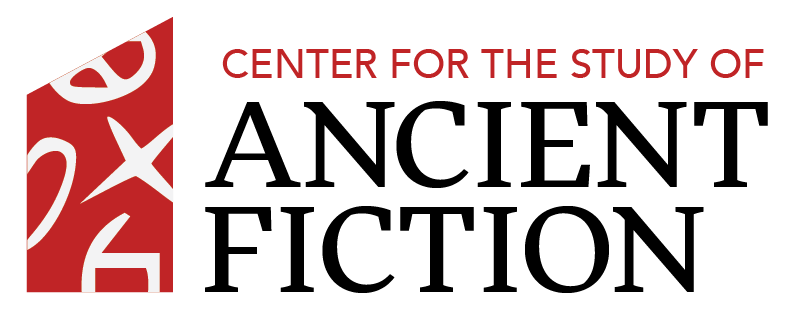
The Center for the Study of Ancient Fiction aims to advance our knowledge and understanding of ancient fictional texts, how ancient story-telling happened across different cultures and languages, and the different ways in which ancient tales have been influential on later literature, up to and including the present day. The Center seeks to promote the circulation of ideas, methods, and interpretive strategies between scholars across disciplinary boundaries, and to foster academic exchange and collaborative research.
(What “ancient” and “fiction” mean differs from discipline to discipline. In Classics, it refers to ancient novels and related prose works, including martyr texts, written during the Roman Empire – not earlier tragedy, epic, and historiography – but we are flexible and inclusive).
Who are we?
The Center is directed by Emilio Capettini and Helen Morales. Emilio is an Assistant Professor in the Classics Department. His research focuses on the transformations of Greek literature and culture during the imperial period, and he is completing a book on Heliodorus’ novel Ethiopian Tales. Helen is Argyropoulos Professor of Hellenic Studies and she also works on ancient Greek novels. She edited and wrote explanatory notes for the Penguin translations of Petronius’ Satyricon and Greek Fiction and is author of Vision and Narrative in Achilles Tatius’s Leucippe and Clitophon (Cambridge University Press, 2004). Her current research is on the sexual politics of stories that circulated in ancient Greek, Latin, Ge’ez, and Arabic.
The directors are advised by a committee of scholars whose research focuses on Medieval and Early Modern fictional texts: Heather Blurton (English), Antonio Cortijo Ocaña (Spanish & Portuguese), and Dwight Reynolds (Religious Studies).
What kinds of events does the Center host?
The launch of the Center in Winter 2021 coincided with the quarter-long visit of Prof. Stephen Trzaskoma from the University of New Hampshire (now Dean of the College of Arts and Letters at California State University, Los Angeles). Its inaugural workshop, which took place at the beginning of March 2021, brought together faculty and graduate students of the ancient novel from North America and Europe.
During the spring quarters of the AYs 2021-22 and 2022-23, the Center hosted two more workshops in which participants discussed pre-circulated papers on the Greek and Roman novels as well as on ideas of truth and fictionality and on the reception of ancient fiction:
- In April 2022, the invited discussants included Stephen Trzaskoma (U. New Hampshire), Koen de Temmerman (Ghent), Aldo Tagliabue (Notre Dame), Karen ní Mheallaigh (Johns Hopkins), Grammatiki Karla (Athens), as well as faculty and graduate students at UCSB.
- In June 2023, the invited discussants included Stephen Trzaskoma (California State University, Los Angeles), Romain Brethes (SciencesPo, Paris), Frederic Clark (USC), Lucas Herchenroeder (USC), as well as faculty and graduate students at UCSB.
Moreover, the Center organized two lectures in addition to the usual research programming of the Classics Department:
- On October 22, 2021, Prof. Margo Hendricks (UCSC) gave a lecture on the early-modern reception of Heliodorus’ novel, titled “And she died… Early Modern Re-Imaginings of Heliodorus’ Ethiopian Tales.”
- On January 13th, 2023, Prof. Sonia Sabnis (Reed College) gave a lecture on the 20th-century reception of the Cupid and Psyche story in Apuleius’ Metamorphoses, titled “Daemon Lovers and Monstrous Pregnancy: Psyche in 20th-Century America.” [The lecture was spotlit on the Humanities and Fine Arts website.]
The events scheduled for the AY 2023-24 are:
- December 8, 2023: Work-in-progess workshop with Valeria Spacciante (Columbia University), who will share her research on tragic plots in Heliodorus’ Aethiopica.
- February 26-March 1, 2024: Richard Hunter (Cambridge) will be Visiting Professor for the week and, in addition to giving a lecture, will offer a workshop for graduate students.
- Winter 2024: Fourth Ancient Fiction Colloquium.
We plan to continue to hold a research colloquium each year as well as to invite visiting speakers.
If you are a prospective graduate student who is keen on ancient fiction, or a colleague in another department whose research interests fall under the umbrella of the Center, then please get in contact with us:






